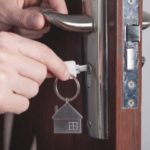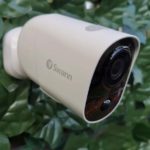Installing security cameras is an essential measure for monitoring and ensuring safety in various spaces such as homes, stores, schools, and hospitals. In addition to traditional wired cameras, wireless or WiFi cameras are becoming increasingly popular due to their convenience and ease of installation.
In this article, FPT Shop will provide a step-by-step guide for installing security cameras at home, which will not only ensure aesthetics but also save on the cost of hiring professional installers. Please follow the detailed steps below!
/fptshop.com.vn/uploads/images/tin-tuc/162394/Originals/cach-lap-dat-camera-1.jpg)
The Standard Process of Installing Cameras at Home
Step 1: Prepare Installation Tools
- Wifi IP Camera (wireless camera) or wired camera
- Accessories that come with the camera such as power adapter, stand, and MicroSD card
- Devices to monitor information from the camera such as smartphone, tablet, laptop/computer
- Modem/router with WiFi capabilities
- Support tools including ladder, screwdriver, pliers, duct tape, drill, nails, and power cord
/fptshop.com.vn/uploads/images/tin-tuc/162394/Originals/cach-lap-dat-camera-2.jpg)
Step 2: Choose the Installation Location of the Camera
Before starting the camera installation process, it is important to choose a suitable location for effective monitoring. Consider the following factors:
- The camera should be installed high up in a position that covers the entire space or the area that requires surveillance, such as the corner of the wall opposite the entrance door or window
- The maximum height for installing the camera is about 3.5m
- Avoid installing the camera in brightly lit or dark locations, except for areas that require specific monitoring like basements, parking lots, and warehouses
- Avoid installing the camera too far from the router/WiFi transmitter to ensure a stable network connection without interrupting the displayed image
/fptshop.com.vn/uploads/images/tin-tuc/162394/Originals/cach-lap-dat-camera-3.jpg)
Step 3: Connect the Camera
The next step in the camera installation process is to connect the power source to the camera. Once connected, the camera will flash a light or emit a sound notification.
- For wired cameras: Connect the network cable to the network connection port behind the camera and connect it to the computer. Turn on the system to adjust the camera’s rotation direction, set the time, and security password.
/fptshop.com.vn/uploads/images/tin-tuc/162394/Originals/cach-lap-dat-camera-4.jpg)
- For wireless cameras: Download the application compatible with the camera from the App Store/Google Play. Scan the QR code on the camera to add the device to the application and customize settings accordingly.
/fptshop.com.vn/uploads/images/tin-tuc/162394/Originals/cach-lap-dat-camera-5.jpg)
Step 4: Install the Camera at Home
Mark the positions on the wall where the camera will be installed based on the holes on the camera stand. After drilling the wall, place the wireless camera stand in the marked position and use screws to secure it. Install the camera on the stand.
If using wired cameras, run the signal cable to the recorder box along the ceiling or corners of the house and secure it with duct tape for aesthetics.
Step 5: Check the Camera’s Operation
After completing the camera installation and network connection, use your smartphone or computer to check if the camera is capturing clear images. Test specific features such as rotating the viewing angle, zooming in on images, and making calls through the camera to ensure all functions are working properly.
/fptshop.com.vn/uploads/images/tin-tuc/162394/Originals/cach-lap-dat-camera-7.jpg)
Additional Notes for Camera Installation at Home
- Choose the type of camera that suits your needs and the space you need to monitor. Consider security cameras designed for indoor or outdoor use.
- For outdoor installations, use cameras with rust-resistant casing and good water resistance. Protect the camera’s power source from exposure to rainwater.
- Select cameras that can rotate 360 degrees and have a night vision mode.
- For wide spaces, consider installing two cameras at diagonally opposite corners to avoid blind spots.
Conclusion
In conclusion, FPT Shop has provided a simple and standard guide for installing cameras at home. By equipping your home with quality camera devices, you can effectively monitor security and ensure safety.
























/fptshop.com.vn/uploads/images/tin-tuc/162394/Originals/cach-lap-dat-camera-6.JPG)
/fptshop.com.vn/uploads/images/tin-tuc/162394/Originals/cach-lap-dat-camera-8.JPG)









